Love Country: Erin Hahn's latest romance novel is humorous, songful, and lyrical

Nothing burns like unrequited love or miscommunication.
The two characters in Erin Hahn’s aptly named new romance novel, Friends Don’t Fall in Love, prove the title either right or wrong by the end of the book. This novel is the spicy second addition to Hahn’s trilogy that started with Built to Last.
Friends Don’t Fall in Love takes place in Nashville, and things are already complicated given that character Lorelai Jones rents the other half of her friend—and crush—Craig “Huckleberry” Boseman’s duplex. The plot presents humor, missteps, sex, music, romance, and the potential for redemption.
The cards are not exactly stacked for these two. Craig and Lorelai are both navigating their thorny profession—and pasts. Craig is growing his indie record label and songwriting prowess after separating from the popular but toxic lead singer, Drake Colter. Lorelai is taking baby steps to rebuild her career after getting kicked out of the spotlight—a choice she made at her last concert—and having that same singer, Drake, break off their engagement.
Despite the setbacks, Craig and Lorelai are both in it for the love of music. Craig reflects on his connection to songs:
For Love and Money: U-M professor Scott Rick explores how couples navigate finances in "Tightwads and Spendthrifts"
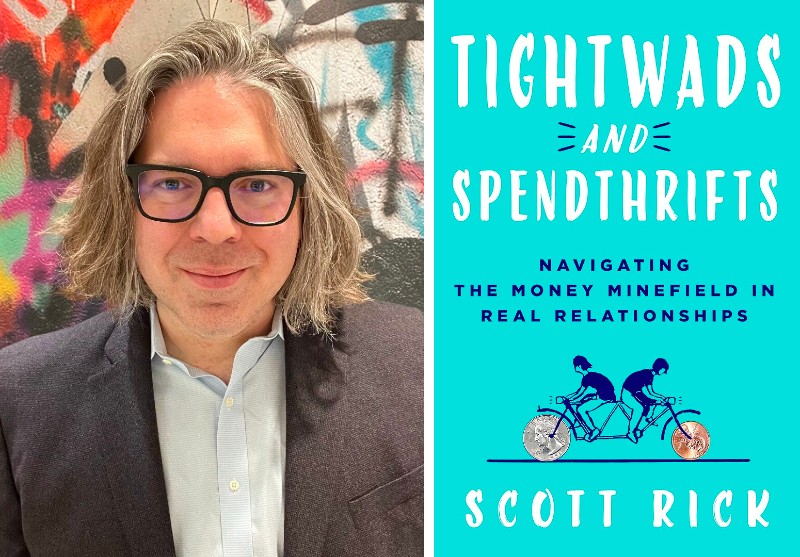
In my family, I’m the person who insists on setting apart the cans that can be returned for deposit, while my husband says, “What do you get, three dollars? Not worth it.”
Perhaps not. But different philosophies about money, at the macro and micro level, are all-too-common in marriage. I mean, there’s a reason that finances always make the list of “things couples fight most about,” right?
To address these differences, Scott Rick, a U-M Ross School of Business marketing professor, has a new book called Tightwads and Spendthrifts: Navigating the Money Minefield in Real Relationships. Billed as distinct from conventional self-help or personal finance books, the book instead uses behavioral science as scaffolding for a broader discussion of how spending plays into our sense of personal identity; why we’re sometimes attracted to people who are quite unlike ourselves (in terms of spending); and practical ways to work through money-related conflicts.
Peak of Success: Nick Baumgardner and Mark Snyder Revisit U-M Wolverines’ 1997 National Championship Season in New “Mountaintop” Book
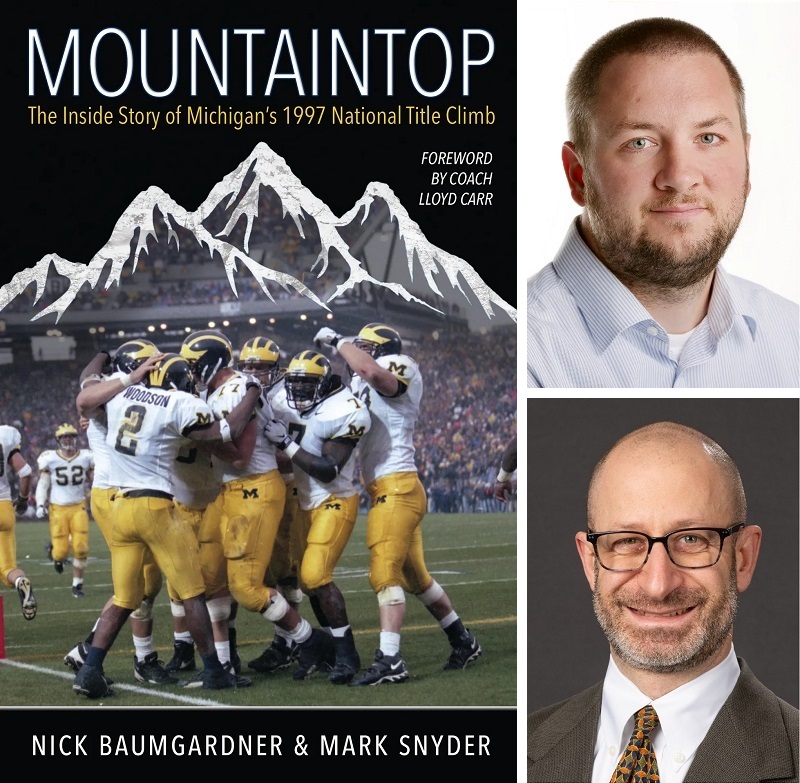
Books about the University of Michigan’s football team could easily fill several shelves, but strangely, one thing that’s been missing is a deep-dive chronicle of the 1997 National Championship season.
Don’t worry, though. Longtime local sports journalists Nick Baumgardner and Mark Snyder just filled that gap by way of a brand new book, Mountaintop: The Inside Story of Michigan’s 1997 National Title Climb.
Yet the arrival of Mountaintop inevitably begs the question: Why did it take so long for a book about that hallowed season to appear in the world?
“A lot of it has to do with Lloyd Carr, who doesn’t like to talk about himself a lot,” said Baumgardner, who now writes about the Detroit Lions for The Athletic. “That’s a big part of it. … The other thing, too, is a lot of these [former players] … they’re protective of it, and they aren’t very trusting about people getting their stories right, so it’s a hard group to crack.”
But crack it he (and Snyder) did, interviewing, over the course of two years, not just every surviving member of the team that they could track down, but also coaches, staffers, and others while doing loads of research, too.
“Mark Snyder came to me; he’d covered Michigan at the Free Press for a long time, and The Oakland Press and The Michigan Daily, and he’d known Lloyd for a long time ... he was certainly closer to him than I was,” Baumgardner said. “Lloyd and a few other people from that era came to Mark with the idea of maybe doing a book, since no one had done one on the ‘97 team.”
Helena Mesa discovers “Where Land Is Indistinguishable From Sea” in her new poetry collection
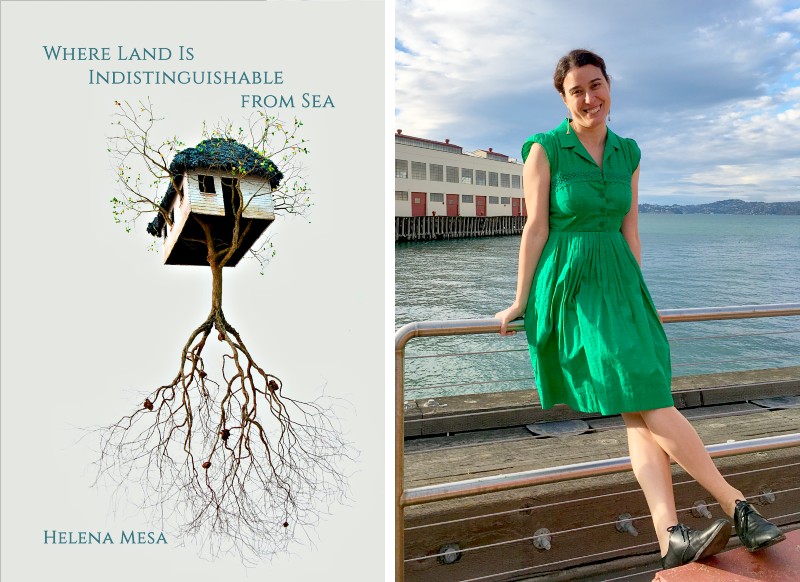
Helena Mesa measures the space between places and people through the poems in her new collection, Where Land Is Indistinguishable From Sea. The poems teem with longing, whether from loss or distance or both.
This longing is sometimes for a person and other times for a place. In the poem “First Year Gone,” the poet speaks to an unreachable person as she undoes her knitting:
You’ve become
a dream, my lips tasting only
damp wool, an ocean bed
drained of seawater, its kelp
drying in summer heat—if only I could
cross the dry basin
before storms flood the ocean once more.
The impossible task of traversing the ocean bed illustrates how “you remain as far now as you were / when I first knit these rows.” The loss is a drought, and more storms are on their way.
Another poem, “After Exile,” narrates some attempts to feed another person’s bird after she has left. The bird does not eat: “It understood longing hungers longer / than anyone could hold out / their hand.” Mesa, too, understands what it is like to not have the one thing that a creature needs, the one joy in this all too bleak life.
Religious undertones permeate the poems, especially Eden which appears in several places even though “I did not ask to be an Eden.” “The Lesson” reflects on the concept of God’s presence when “She said, He is everywhere, / even inside you.” While Eve must deal with her shame in the garden after eating the forbidden fruit, the shame becomes a side effect in Mesa’s poem. Exile moves to the forefront, and it is even a foregone conclusion at the outset of sin because “He lived inside her / and felt the thought form.” Another poem calls forth “Lot’s Daughter,” and the poem titled “The want for faith” describes the tenuous nature of faith that allows one “to glimpse / what might be the blurred edge / of a dog chasing a hare / or nothing at all.” Clarity is elusive.
The longing in these poems brings not just the ache of loss but also the occasional fruit of “sweet persistence.” The poem named “Waiting to Meet in San Francisco” is breathless with hope, and the poet takes the imperative to implore: “Say yes. Say you will / let go, say you’ll never, / say air will catch us both.” The time of day also brings splendor, as “Morning crackles more clearly through the trees.” Brightness seems to cut through the grief and desire.
Since some loved ones are gone forever and religion does not provide all the answers, Mesa’s poems continue questioning what distance means. Mesa’s parents left Cuba for the United States when they were young, and that drastic move informs poems in the collection. The recurring questions about time and space appear in multiple poems, such as “Catalog of Unasked Questions,” which starts with the lines:
How far before home
receded beyond the horizon?
(54 km) How far before It’s too late
to turn back? (22 km)
The mileage and time add up. These totals may or may not change the outlook, as the last question of the poem asks:
…And how far
Before the distance
No longer felt distant?
( )
Distance is the reality as “Everyone I’ve ever known / lives so far.” Fulfillment remains out of reach given that “The map to reach you pale and wordless” does not offer answers to close the distance.
Mesa lives in Ann Arbor and teaches at Albion College. I interviewed her about Where Land Is Indistinguishable From Sea.
AADL 2023 STAFF PICKS: HOMEPAGE
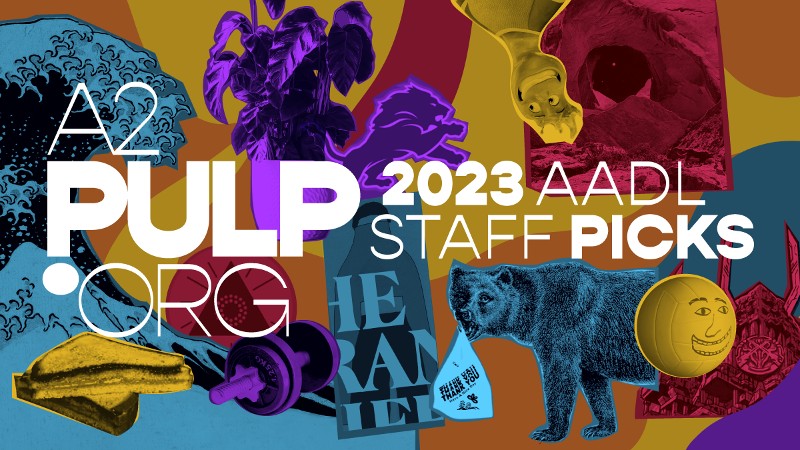
People who work at the Ann Arbor District Library love to give recommendations.
Whether in person at one of the five branches, in the News and Reviews section of AADL's website, or right here at Pulp, highlighting our favorite books, films, TV shows, video games, websites, adventures, and more is just part of the gig.
Like you, we are passionate enjoyers of media and experiences.
This is our seventh year compiling Ann Arbor District Library staff picks—and with more than 40,000 words spread out over four posts, it is the longest edition yet.
To reiterate: We. Love. To. Give. Recommendations.
Here are the creative works and experiences we discovered in 2023 that moved us enough to share them with you. (Not that you needed to twist our arms.)
➥ AADL 2023 Staff Picks: Words
➥ AADL 2023 Staff Picks: Screens
➥ AADL 2023 Staff Picks: Audio
➥ AADL 2023 Staff Picks: Pulp Life
AADL 2023 STAFF PICKS: WORDS

➥ AADL 2023 Staff Picks: Homepage
➥ AADL 2023 Staff Picks: Screens
➥ AADL 2023 Staff Picks: Audio
➥ AADL 2023 Staff Picks: Pulp Life
AADL 2023 STAFF PICKS: WORDS
Books, audiobooks, graphic novels, comics, websites, and more:
AARON BURCH EMBRACES AMBIGUITY AND NOSTALGIA IN HIS NEW ESSAY COLLECTION, “A KIND OF IN-BETWEEN”
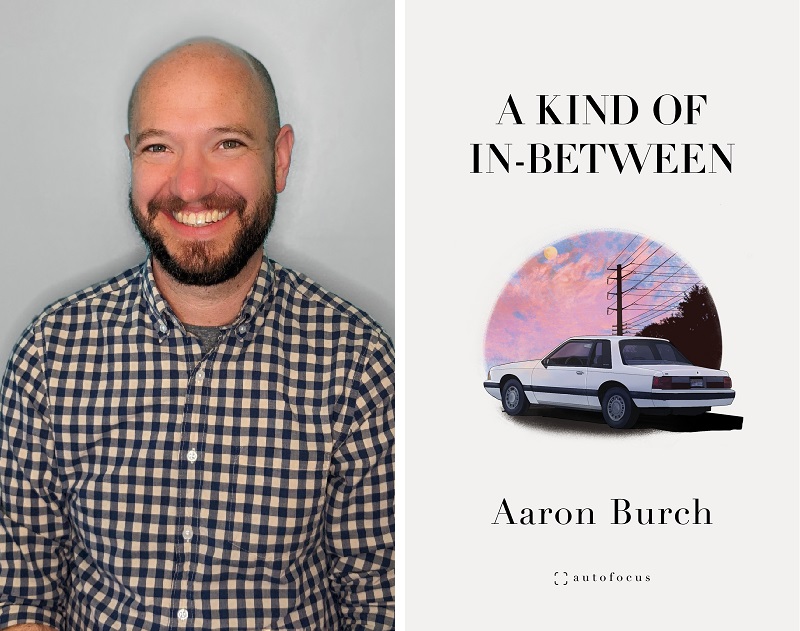
Aaron Burch recounts major life changes and memories in the essays of A Kind of In-Between. Throughout the pages, Burch questions what is important in life. What do you remember? What does it mean? Why are you happy or not?
Focusing on the places he has been is one approach that Burch takes to inform these inquiries. He shares that he grew up in Washington and has subsequently lived in Michigan and Illinois as an adult. In the sentence that lends itself to the book’s title, he narrates his road trip:
I’m somewhere in the middle of Pennsylvania, driving around this big, long turn while also going down a decent decline. I don’t know how steep; I don’t really have any idea how to measure or guesstimate that kind of thing. I can tell it’s steeper than anything in Michigan but less so than Washington, a version of the kind of in-between that I return to again and again—known but not, neither childhood nor adult, not quite then or now, here or there.
This ambiguity begins in the physical world and then seeps into other contexts. The human urge to name and define things breaks down when something is neither one nor the other. Burch concludes this essay called “Ohiopyle” with a question: “Were you to ask me, somewhere in the middle of Pennsylvania, whether home meant Washington or Michigan, what would I answer? I’m not sure.” Still, maybe one does not have to decide, as Burch highlights “the interconnectedness of everything and everyone” in the first essay of the collection.
This Is Your Song: Jeff Tweedy's New Book Makes Us Think About How We Connect With Our Favorite Music
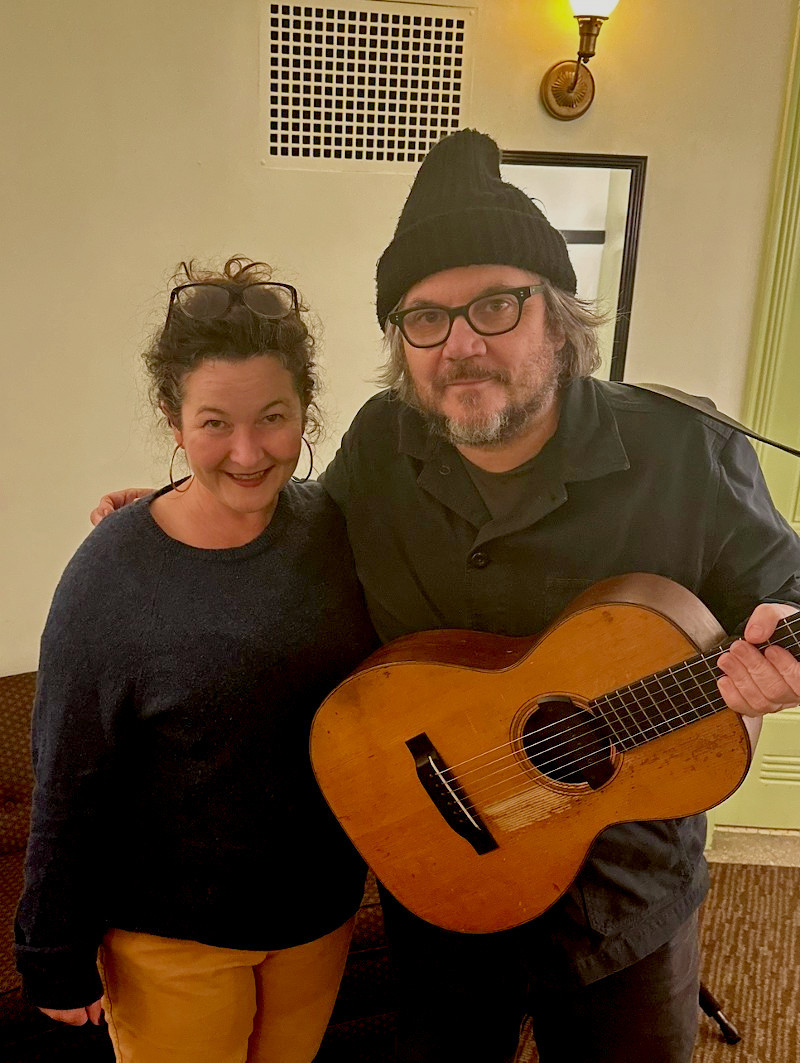
Back in 2009, I actually heard Wilco for the first time.
It’s not that I didn’t know the band’s music, but it was the first time I had developed an emotional connection to one of their songs.
It was “You and I,” a heartwarming duet with Feist from the band’s self-titled album. The track addresses two lovers trying to preserve a relationship as Wilco frontman Jeff Tweedy sings, “You and I, we might be strangers / However close we get sometimes / It’s like we never met.”
While I’ve never met Tweedy and or any of the other Wilco members, “You and I” emanates a comforting familiarity in terms of its memorable lyrics, bittersweet harmonies, and smooth bassline.
There’s an unexplainable pull I feel to it, and it’s something Tweedy easily masters after nearly three decades of writing Wilco songs.
“I’m much more fascinated by the blurry area between a song and the mind that receives it, puts it back together in a shape that fits their own life, and allows the heart to take ownership,” writes Tweedy in his latest book, World Within a Song: Music That Changed My Life and Life That Changed My Music.
That statement nicely encapsulates the key takeaway from Tweedy’s third book, which highlights the memorable connections—both positive and negative—he’s made with 50 different songs throughout his life.
The Lord of the Screens: U-M professor Daniel Herbert chronicles the history of New Line Cinema in "Maverick Movies"

Late August at Hotel Ozone. Stunts. Get Out Your Handkerchiefs. A Nightmare on Elm Street. Critters. House Party. Teenage Mutant Ninja Turtles. Twin Peaks: Fire Walk with Me. Dumb and Dumber. Austin Powers: International Man of Mystery. Hedwig and the Angry Inch. The Lord of the Rings. The Notebook.
These films all have one thing in common: New Line Cinema.
University of Michigan film and media professor Daniel Herbert chronicles and analyzes the history of the production studio and its films in his new book, Maverick Movies: New Line Cinema and the Transformation of American Film.
Herbert initially launched his interest in New Line by teaching a course on the company. Back in 2010, the idea came from U-M librarian Philip Hallman, who also speculated about a possible book. The class evolved, and Herbert conducted extensive research that culminated in his book. He studied the Robert Shaye-New Line Cinema Papers and the Ira Deutchman Papers, which are in the Screen Arts Mavericks and Makers collection at the Special Collections Research Center of the University of Michigan Library. The closing lines of the book describe the origins of its title:
Public and Personal Policies: Airea D. Matthews’ autobiographical poetry collection questions economic theory amid the realities of poverty and violence
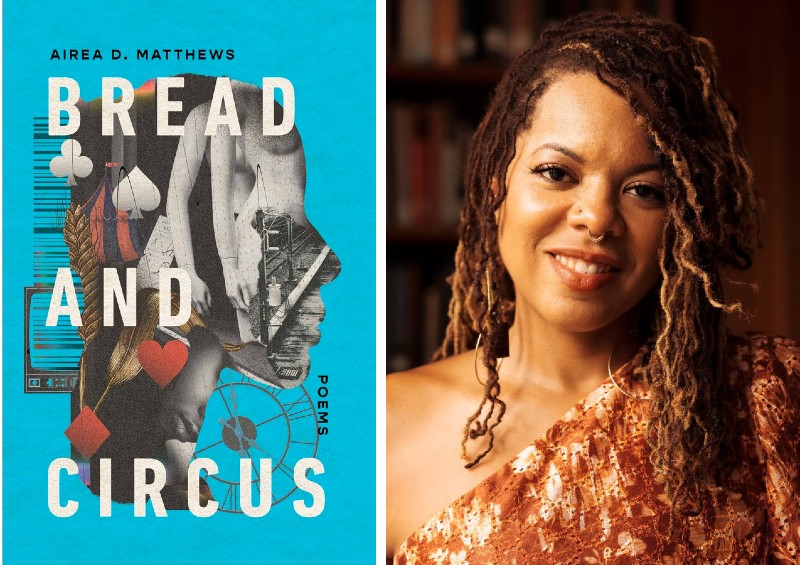
Necessity and amusement. Sustenance and transaction. Security and turmoil.
Airea D. Matthews’ autobiographical poetry collection, Bread and Circus, brims with contrasts. One situation or item is paired with another to show a lack or miscalculation. The poems hover on a precipice, even as the guests “…watch a lovely commodity / reluctantly agree to her own barter.”
Early in the book, the poems witness a shotgun marriage, and the family grows in the subsequent years. Making ends meet results in how “Papa despised the vestiges of a hand- / out” – and especially “one specific symbol of his failure – corn.” Over time, the father’s drug addiction causes trauma, along with broken promises like, “I owe you a bike, right?” though it never materializes. These memories stick in the poet’s mind, as the poet reflects on a past hurt:


































